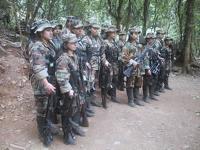-
U.K. reviews security measures for large outdoor events
Amber Rudd, the new British home secretary, told the House of Commons that she has ordered a full review of the security measures taken to protect large outdoor events such as festivals and other public gatherings. The review comes in the wake of the attack in Nice on revelers celebrating Bastille Day. Rudd said that additional security measures will be put in place, including what is known as the “national barrier asset” when police assess that there is a risk of vehicle attacks.
-
-
Brazilian Jihadist group pledges allegiance to ISIS on eve of Olympic Games
A Brazilian Jihadist group called Ansar al-Khilafah, has pledged allegiance to ISIS less than a month before the opening of the Olympic Games in Rio de Janeiro. It is the first pledge of allegiance to ISIS to come from South America. Portuguese and Spanish versions of ISIS’s Nashir have also been launched on the encrypted Telegram messaging app.
-
-
Shooter motivated by 1960s-era Black Nationalism

Gavin long, 29, who shot and killed three policemen in Baton Rouge before being fatally shot by the police, appears to have been motivated by 1960s-era Black Nationalism, which called on African Americans to take a strong, even violent, stance against mistreatment by authorities. Long left a long trail of on-line material, both postings and videos. In another video, referring to Native Americans, Long said, “When they were extincted [sic] by the same people that run this country, my question to you, just something you can think about: At what point should they have stood up?”
-
-
Was the Nice attacker really an IS "lone wolf"?
The Bastille Day terror attack on the Promenade des Anglais in Nice has been claimed by the Islamic State Group – sort of. With no clear connection to Jihadi groups (and merely a record as a petty criminal), French officials are trying to ascertain whether Bouhlel was a lone actor terrorist or a mentally ill person with whom IS is opportunistically associating. The idea that a mass casualty perpetrator is likely to be suffering from mental illness is consistent with the research on lone actors. My research on suicide terrorism has demonstrated that affiliation with a group is quite different from the research of Criminal Justice professor Adam Lankford of the University of Alabama who insists that many terrorists are suicidal and not sacrificing themselves for a greater cause or for some underlying altruistic motivation of self-sacrifice. The implications for policy and the potential for backlash from terrorists and counter terrorists vary greatly depending on which scenario ends up being accurate for Bouhlel, whether he was in fact radicalized or possible mentally ill matters.
-
-
Senators supporting Iran nuclear deal urging greater transparency in reporting on Iran’s nuclear program
Senator Gary Peters ((D-Michigan) on Friday led fourteen of his colleagues in sending a letter to President Barack Obama urging the administration to work with the International Atomic Energy Agency (IAEA) to encourage additional transparency when reporting on Iran’s nuclear program.
-
-
Turkish military seizes power in Turkey
The Turkish military announced a few hours ago (Friday afternoon, EST) that it has seized power, and that the government of President Tayyip Erdogan, in power since 2003, has been deposed. Prime Minister Binali Yildirim, however, said in a hastily arranged press conference that while it was not clear who was in chare in Turkey, he was confident the attempted coup would be put down. There is no information about Erdogan and his whereabouts, but the Turkish sister channel of CNN said he was “safe” in an unknown location. The military has declared martial law in the country, imposed a 10:00 p.m. (Turkey time) curfew, and placed soldiers in the offices of all TV stations and major newspapers.
-
-
At least 84 killed, more than 200 injured, by a terrorist driving a truck into 14 July crowd
At least eighty-four people were killed Thursday when a 31-year old Tunisian plowed into a crowd celebrating Bastille Day in Nice, France. He accelerated, and continued to drive for about 1.5 miles, running over people who crowded the boulevard. More than 200 were injured, some of them are in critical condition. Police shot and killed the driver, Lahouaiej Bouhlel, who had a residency permit to live and work in France.
-
-
The perpetrator: Unstable loner with a history of petty crimes, interest in “girls and salsa”
The driver of the truck was identified as Lahouaiej Bouhlel, a 31-year-old Tunisian, who had a residency permit to live and work in France. He was a divorced father of three, and neighbors said he had become depressed after the breakdown of his marriage. The neighbors said that Bouhlele was not particularly interested in religion, adding that he preferred girls and salsa.
-
-
France has a long history of violence and terrorism
France has a long history of violence carried out by different groups with different ideologies and goals. Until the rise of Islamist terrorism in the last twenty years, most of the violent and terrorist acts in the post-World War Two era belonged to three categories: Separatist movements; terrorism related to the Algerian War; and terrorism by various groups in the Middle East and North Africa.
-
-
Austrian court sentences an Islamist hate preacher to 20 years in prison
A criminal court in Graz, Austria, on Wednesday sentenced an Islamist hate preacher, who has adopted the name Ebu Tejma, to twenty years in prison — the harshest sentence so far for convicted Islamists in Austria. He was sentenced on one count of membership in a terrorist organization and one of promoting terrorist activities.
-
-
How did classified information get into those Hillary Clinton e-mails?

FBI director James Comey publicly rebuked Hillary Clinton for being “extremely careless” in handling classified information while she was secretary of state. Were the secretary of state and her aides careless with such information? And how can they maintain that they did not knowingly mishandle classified information? To answer these questions, we need to understand two facts about the classification of information and its transmission. First, the determination of what information is classified is subjective, meaning that reasonable people can disagree about the relative sensitivity of particular information. In fact, different agencies disagree about issues like this all the time. Second, Clinton has not shared classified documents, and this is not something she is accused of. It is extremely difficult to share a classified document electronically over e-mail, because most government agencies, including the State Department, maintain separate systems precisely to make it all but impossible to electronically pass information between classified and unclassified systems. This is partly why Clinton and her aides say so assuredly that they did not knowingly e-mail classified materials. The issue is thus whether she and her aides should have known that matters discussed in e-mails were classified or sensitive.
-
-
A faction of Colombian FARC rebel group rejects peace deal, refuses to disarm

The Armando Rios First Front, a unit of Colombia’s FARC rebel group, has said it will not disarm or demobilize, as it is required to do under the peace deal reached between the FARC and the government of Colombia. The deal, which ends the 52-year guerrilla war between the FARC and successive Colombian governments, was signed in Havana, Cuba, three weeks ago. The announcement by the First Front is the first public sign of opposition to the from within the rebel ranks. Colombian government sources said that other FARC factions could also reject the peace agreement, and that if enough of them did so, it would throw the peace process into doubt.
-
-
10 years after Second Lebanon War, Israel concerned next round will be far worse
On the ten-year anniversary of the beginning of the Second Lebanon War, Israeli officials continued to warn that any future conflict with Hezbollah will result in unprecedented damage to the group. A senior IDF official said that the difference between the next war and 2006 “will be the difference between an operation and a war. 2006 was an operation, and we didn’t use all of our power. Next time it won’t just be planes flying around. … We will use all of our power to destroy Hezbollah militarily.”
-
-
ISIS prepares followers for end of caliphate
In the face of an ever-more-effective campaign by the U.S.-led coalition — a campaign which has substantialy reduced the size of the ISIS-controlled areas in Iraq and Syria; decimated ISIS’s oil-production and distribution infrastructure; killed many senior commanders and operatives; and, with the help of Turkey, choked off the flow of foreign fighters to replenish the organization’s dwindling ranks – ISIS leaders have begun to prepare followers of the Islamist organization for the fall of the ISIS-established caliphate.
-
-
ISIS boasts killing 5,200 people during the month of Ramadan
ISIS has boasted that its Islamist fighters have killed 5,200 people in “military operations” during the holy month of Ramadan. An infographic in the group’s Arabic-language weekly magazine al-Naba, ISIS lists fourteen terrorist attacks group followers carried out in Europe, the United States, Asia, Africa, Syria, and Iraq. ISIS claims the victims include nearly 2,000 Shiites, 1,000 Kurds, 600 Syrian Alawites, and 300 Christians.
-
More headlines
The long view
Factories First: Winning the Drone War Before It Starts
Wars are won by factories before they are won on the battlefield,Martin C. Feldmann writes, noting that the United States lacks the manufacturing depth for the coming drone age. Rectifying this situation “will take far more than procurement tweaks,” Feldmann writes. “It demands a national-level, wartime-scale industrial mobilization.”
No Nation Is an Island: The Dangers of Modern U.S. Isolationism
The resurgence of isolationist sentiment in American politics is understandable but misguided. While the desire to refocus on domestic renewal is justified, retreating from the world will not bring the security, prosperity, or sovereignty that its proponents promise. On the contrary, it invites instability, diminishes U.S. influence, and erodes the democratic order the U.S. helped forge.
Fragmented by Design: USAID’s Dismantling and the Future of American Foreign Aid
The Trump administration launched an aggressive restructuring of U.S. foreign aid, effectively dismantling the United States Agency for International Development (USAID). The humanitarian and geopolitical fallout of the demise of USAID includes shuttered clinics, destroyed food aid, and China’s growing influence in the global south. This new era of American soft power will determine how, and whether, the U.S. continues to lead in global development.
Water Wars: A Historic Agreement Between Mexico and US Is Ramping Up Border Tension
As climate change drives rising temperatures and changes in rainfall, Mexico and the US are in the middle of a conflict over water, putting an additional strain on their relationship. Partly due to constant droughts, Mexico has struggled to maintain its water deliveries for much of the last 25 years, deliveries to which it is obligated by a 1944 water-sharing agreement between the two countries.
How Disastrous Was the Trump-Putin Meeting?
In Alaska, Trump got played by Putin. Therefore, Steven Pifer writes, the European leaders and Zelensky have to “diplomatically offer suggestions to walk Trump back from a position that he does not appear to understand would be bad for Ukraine, bad for Europe, and bad for American interests. And they have to do so without setting off an explosion that could disrupt U.S.-Ukrainian and U.S.-European relations—all to the delight of Putin and the Kremlin.”
How Male Grievance Fuels Radicalization and Extremist Violence
Social extremism is evolving in reach and form. While traditional racial supremacy ideologies remain, contemporary movements are now often fueled by something more personal and emotionally resonant: male grievance.
